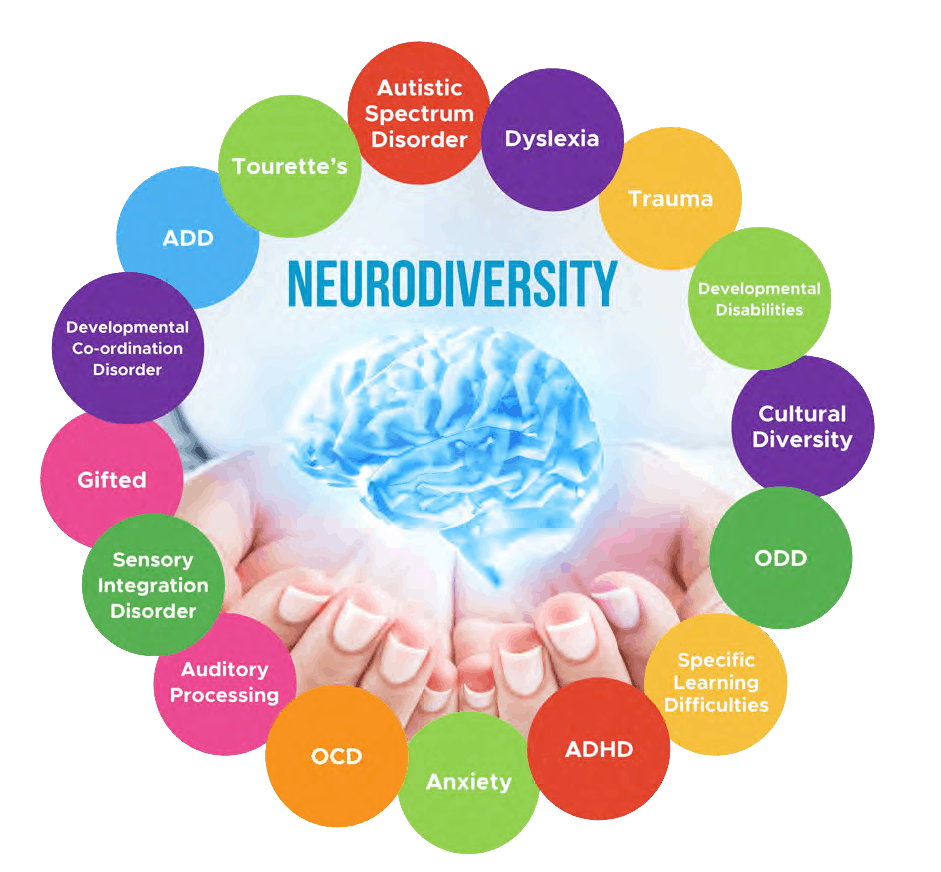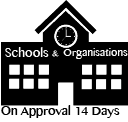Neurodiversity is the concept that neurological differences between people should be recognised
and respected. Instead of using terms like ’dys – function’ ‘dis- abilities’ & ‘dis-orders’ neurodiversity is an
enabling term that takes into account neurological differences. Neurodiversity – is not one size fits all.
We are all different and neurodiversity celebrates difference.
Below are some of the diagnosis and environmental factors that would be considered in Neurodiversity.

I personally love the term neurodiversity, as many children I meet don’t have official “labels” yet, but their family, educators, etc. notice their different way of engaging in learning. My passion is to ensure these children get the most out of their educational settings by putting in place strategies and accommodations that support their specific learning style.
One way to do this is to put in place strategies to ‘make learning fun’.
Neurological differences – Strategies for Making Neurodiversity Learning Fun

Neurodiversity – Actionable Example Strategies from the Podcast for Educators:
- Use turn-taking strategies for activities like writing or puzzles
- Stop activities while students are still enjoying them to maintain interest
- Incorporate games to teach various concepts
- Use timers to help students manage time and stay focused
- Employ scribes or typing tools for students who struggle with handwriting
- Implement quick task-quick reward systems
- Include movement breaks between learning activities
- Utilize students’ strengths in every lesson
- Make mistakes a positive learning experience
- Use music to make routine tasks more enjoyable

Understanding Neurodiversity Acronyms
Ever wanted to know what all the neurodiversity terms were?
Download this sheet for explaining neurodiverse terms and details

Sue Larkey
Teacher, Masters Special Education, Author, Speaker
Sue Larkey is a highly qualified educator with extensive experience teaching neurodiverse students, particularly those on the autism spectrum, in both mainstream and special education settings. She combines practical experience with rigorous research, having completed a Masters in Special Education and the research components of a Doctorate in Education. Sue’s passion for neurodiversity is evident in her popular Sue Larkey Podcast, which has over 200 episodes and 1.3 million downloads. She has authored numerous books on autism spectrum disorders and other forms of neurodiversity. Sue firmly believes that with understanding and confidence as tools, much can be achieved for neurodiverse individuals.
Some of Sue Larkey’s achievements in the field of neurodiversity include:
- ‘Sue Larkey’ Podcast: over 1.3 million downloads
- Podcast resources used by Leading Universities to train teachers such as Monash University, Canberra University
- #1 Ranked Apple Podcast in Australia (Course Category)
- Weekly E-Newsletter reaching over 135,000 subscribers across 30+ countries
- Author of 18+ books for educators, teaching assistants, and parents/carers of neurodiverse individuals
- Cultivated a 130,000-strong Facebook community dedicated to embracing neurodiversity and making a difference
- Recipient of the 2013 Naturally Autistic International Award for Community Contribution
- Delivered hundreds of speeches, including at international and national conferences on neurodiversity
- Recognized as a trusted source of knowledge, compassion, and inspiration for parents/carers, support workers, teachers, teaching assistants, educators, and others involved in supporting neurodiverse individuals
Free Webinar
Teaching Strategies and Behaviour Support for Early Childhood Settings
with Sue Larkey

- How to adapt activities to meet ALL children’s learning needs
- 5 Key Ways to make Learning Fun
- Strategies to help children with separation anxiety
- Embracing difference to make a difference
- Strategies to increase engagement and participating during mat time
- The ONE strategy I wish I knew years ago for helping children with fine motor skills
For even more strategies and Ideas for teaching students with Neurodiversity –
Video Modelling to Support Neurodiverse Learning at School and Home
A Guide to Help Kids Enjoy and Feel Confident About Writing
Teaching Kids Skills Through Board Games


 Sorry we no longer ship items outside Australia. Please consider the digital versions of Sue’s Books –
Sorry we no longer ship items outside Australia. Please consider the digital versions of Sue’s Books – 